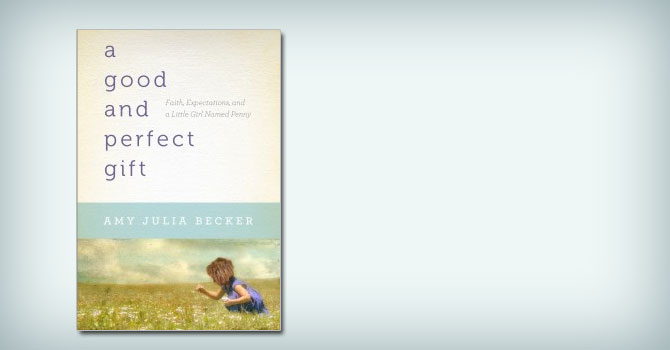Editor’s note: The following is an excerpt from “A Good and Perfect Gift: Faith, Expectations, and a Little Girl Named Penny” by Amy Julia Becker, © Copyright 2011 by Amy Julia Becker. Used with permission of Bethany House Publishers, a division of Baker Publishing Group.
We arranged to use Lawrenceville’s chapel for the baptism. On Sunday morning, November 12, we dressed Penny in her great-grandmother’s christening gown. She sat on the plush red carpet that surrounded the altar, with her translucent skin and wide blue eyes, her soft brown hair and the long, creamy, lace gown draped around her. The fairy-tale portrait was interrupted by a Boston Red Sox bib, protecting the gown from any drool or food.
“Don’t worry,” I told my sister Kate, Penny’s godmother-to-be. “I’ll take it off before the service starts.”
Kate leaned down and put her face close to Penny’s. “I will make sure your mom remembers to take off the bib.”
Penny batted her eyes.
We got everything set up -- flowers at the altar, two of Peter’s students to hand out programs. I checked in with a friend who had agreed to play the piano. We made sure the microphones worked and that various friends and family members knew their roles in helping the ceremony proceed. As the pews began to fill, I removed Penny’s bib and ran my hands along the delicate lace of her gown.
Over one hundred people showed up. Dozens of Peter’s colleagues and students. A few friends from church. Family members from all over. Atheists, Jews, Muslims, and Christians all gathered for the occasion. Peter stood to welcome the faces that lined the wooden pews. “I know that sitting in a chapel is not what many of you do every week. But we’re so honored that you would choose to be here this morning to join us in receiving God’s work in our daughter’s life and in our family’s life. We’ve tried to keep the service simple, but we know there will be parts that might feel unfamiliar -- prayers or hymns or even the whole baptism thing. Please don’t worry if you don’t know what’s going on, but we hope you’ll participate to the degree that you feel comfortable. And be sure to sing out!”
Sing out they did. The voices filled the cavernous space, as if to embrace us. We sang “Praise to the Lord,” an old hymn. I had always loved it, but I was struck for the first time by the penultimate verse:
Praise to the Lord, Who doth prosper thy way and defend thee;
Surely His goodness and mercy shall ever attend thee.
Ponder anew what the Almighty can do, Who with His love doth befriend thee.
Ponder anew what the Almighty can do … With Penny propped upon my hip, I thought, Yes, God can do new things. New things in my life. New things in my heart. New things in our family. I kissed the top of her head as the hymn came to a close.
A few minutes later, I walked to the lectern to offer my reflections on the readings we had chosen for the day. Kate had read from 1 Corinthians 13, Paul’s famous passage about love, most commonly heard at weddings. Our friend Susannah read from Mark 9, where Jesus received the children even though the disciples thought He would see them as a nuisance and had tried to shoo them away. My heart pounded more quickly than usual. I had spoken about my beliefs in a church context before, and in one-on-one conversations, but never to a crowd like this one. And yet the only way for me to explain my love for our daughter was through the lens of faith. I took a deep breath and began:
The passages that Kate and Susannah just read have meant a lot to us these past ten months. Both of them contain a contrast. In 1 Corinthians 13, Paul begins by talking about things like “speaking in the tongues of men or of angels” or “having faith that can move mountains.” He contrasts these things -- these impressive traits -- with what it means to have love, and he says that without love, those previous things have no value. In the second passage, we hear about Jesus and His disciples, and we receive another contrast. First there are the disciples, wondering who is the greatest. Then there is the child, a representative of “the least among them.” And it is the child who becomes the model for the disciples, and for all of us.
One week after Penny was born, a friend called and shared that verse from Mark’s gospel: “Whoever receives this child, receives me,” and she said, “Amy Julia, I have a sense that this is true for you with Penny.”
The more we receive Penny, the more we welcome her, exactly as she is, the more we welcome God’s work in our lives.
As I spoke, I made eye contact with people in the pews. Some sat with quiet smiles, others were nodding their heads.
One of the things that Penny’s life has shown me so far is how different God’s values are from my values, and from many of our culture’s values. Going back to Paul’s letter to the Corinthians for a minute, I have realized in the past few months that I am very impressed by education, by the ability to be articulate and communicate clearly. I don’t think it’s bad, in and of itself, for me to be impressed by these things, yet it makes me ask myself whether I am more impressed by good speeches and college degrees than I am by love.
I paused for a moment, scanning the crowd. There was Chris, and Tom, and Michael -- Peter’s colleagues who each had spent decades in school and still read scholarly journals regularly. There were his students, who all worried about the homework they needed to finish and whether they looked good today and what their future held. There was our family, who knew better than anyone else the truth of my statements. Kate, who had often urged me to put down the books and play kick-the-can or go for a swim or just hang out. Mom and Dad, who had encouraged me not to work so hard in high school. And here was my chance to say it out loud: I was wrong. For so much of my life I valued the wrong things, or at least I valued them in the wrong way. And this little girl of ours had helped me to see it.
I glanced at Penny, seated on her father’s lap in the first pew. Her body swayed, as if she could hear music playing. I kept my eyes on her as I continued:
It seems to me that God values the love that Paul describes -- patient, kind, selfless love -- above carefully crafted sentences and even above public professions of faith. I’m pretty sure that Penny is going to teach me a lot about God’s values, about God’s kind of love.
To give one small example, let me share a story. There was one morning, a few weeks ago, when Penny woke up around five-thirty. I wasn’t ready to get out of bed, so I decided to see if she would wait for me. I turned off the monitor, knowing that I would hear her if she cried loudly, and I set the alarm for 6:30. When I woke up an hour later, there was Penny, still quietly babbling in her crib, waiting for me. It struck me then that she might already, as an infant, know more about patient love than I do.
Penny has Down syndrome, an extra twenty-first chromosome in every cell of her body. We were told early on that we could count on two things: that she would have delays in her physical development, and that she would have some degree of cognitive impairment. I’m starting to realize that, for some reason, her extra chromosome is not only associated with delays and impairments. It is also associated with sweetness, joy, wonder, patience, and love. And despite the challenges her extra chromosome will bring, I wouldn’t trade it for the world. Penny is who she is, and we love her more every day.
Today we stand before you all, and before God, delighted to welcome our daughter, Penelope Truesdell Becker, as God’s child, God’s gift of love to us and, we hope, to this community.
I took my seat, and Daniel, Peter’s roommate from college, resumed his place at the front of the chapel. He wore the long black robes that went with his newly acquired seminary degree and his ordination into the Presbyterian Church. He and his wife, Susannah, would become Penny’s godparents, along with my sister Kate and Peter’s brother Christian. Daniel and Susannah lived in Virginia, but he was still Peter’s closest friend. After Penny was born, Daniel was the first person outside of the family whom Peter called.
Daniel offered an explanation of baptism itself, this ancient covenant with God, this symbolic act that mirrored Jesus’s death and resurrection. And then he led the congregation in a reminder of the Christian faith: “We believe in God …”
They were words I had uttered throughout my life -- at Christmas and Easter, every Sunday when Peter and I used to attend an Episcopal church. There were times in my life when they had lost their meaning. There were times when I had wondered if they could possibly be true, these proclamations of faith in a man who was God, in a man who died a criminal’s death, in a man whose death was overturned and who offered me life with God forever. And yet that day, in that chapel, with Penny in Peter’s arms, the folds of her gown draping down to his knees, I meant every word I spoke. I believe in a God who doesn’t always make sense. I believe in a God who overturns expectations and cannot be controlled by me. I believe in a God who loves so deeply as to be willing to allow us to suffer, that we might know fullness of life. The words resounded from the pews to the altar, filling the space with faith, with hope. I believe.
We proclaimed our faith, and Christian led the congregation in prayer, and then Daniel cupped his hand in the water and poured it over Penny. She squirmed as he said, “We receive you into the household of God. Confess the faith of Christ crucified, proclaim His resurrection, and share with us in His eternal priesthood.”
There it was. Our daughter, a daughter in the household of God. One whose life would be marked by God’s life. One who would share in Jesus’s sufferings and His glory.
Daniel held her in his arms as if she were sitting in a chair and walked her down the aisle as the congregation shared a greeting of peace with one another and reached out to congratulate Penny. We concluded the service with a hymn we had sung at our wedding: “Come Thou Fount of Every Blessing.” And like that wedding day seven years earlier, this day was a day of blessing, a day of delight.
It took us a while to get home after the service, but when we did, we finally opened the bottle of champagne that had remained corked in the hospital after Penny’s arrival. Surrounded by family and friends, we raised our glasses to welcome our daughter.








